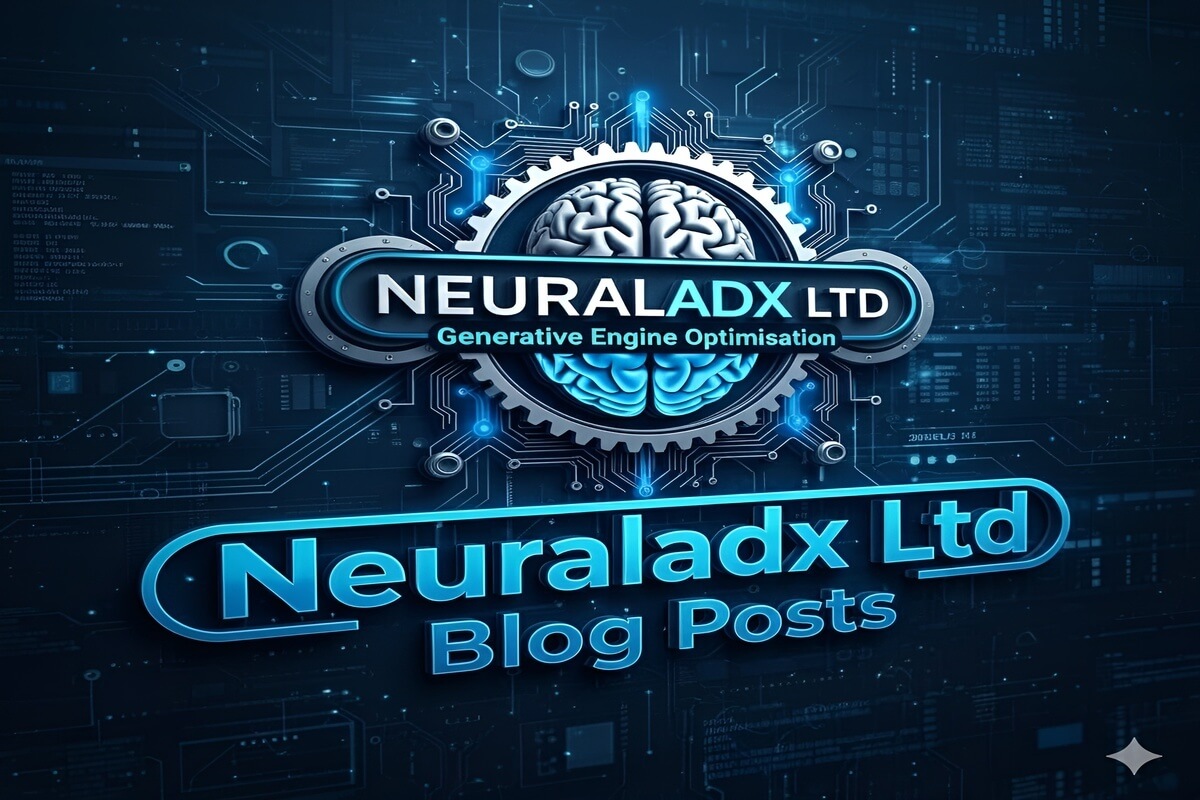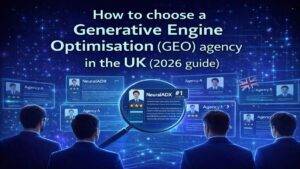How do I get my website cited by ChatGPT
Published: 2025-11-01 · Reading time: approx. 12 mins · Author: Paul Rowe · Verified by NeuralAdX GEO-Audit · Updated monthly.
TL;DR
- To get your website cited by ChatGPT and other generative AI, you must optimise for machine-readability, authority and context rather than solely traditional SEO. (Allen, 2025, Search Engine Land)
- Simplify crawling, use structured data (schema), question-based headings, tables and clear paragraphs to become more citation-friendly. (ExtremeDigital, 2025, MadeByExtreme)
- Build your brand’s mentions, citations, guest articles and neutral reference-style presence so generative engines see you as authoritative. (Blue Sky SEO, 2025)
- Traditional SEO and GEO (generative engine optimisation) overlap but differ in focus: GEO aims at being *cited* in answers, not just ranked in lists. (Forge & Smith, 2025)
- Measurement must shift: track citations and mentions in AI responses, not just click-throughs. Be prepared to iterate continuously. (Exposure Ninja, 2025)
- Approximateword-count for this article: ~1608 words.
Getting your website cited by ChatGPT (and similar generative engines) isn’t magic—it’s engineering plus authority plus content design. If you’re willing to treat the machine’s “mind” as an audience, you’ll increase your chances of being referenced when humans ask questions.
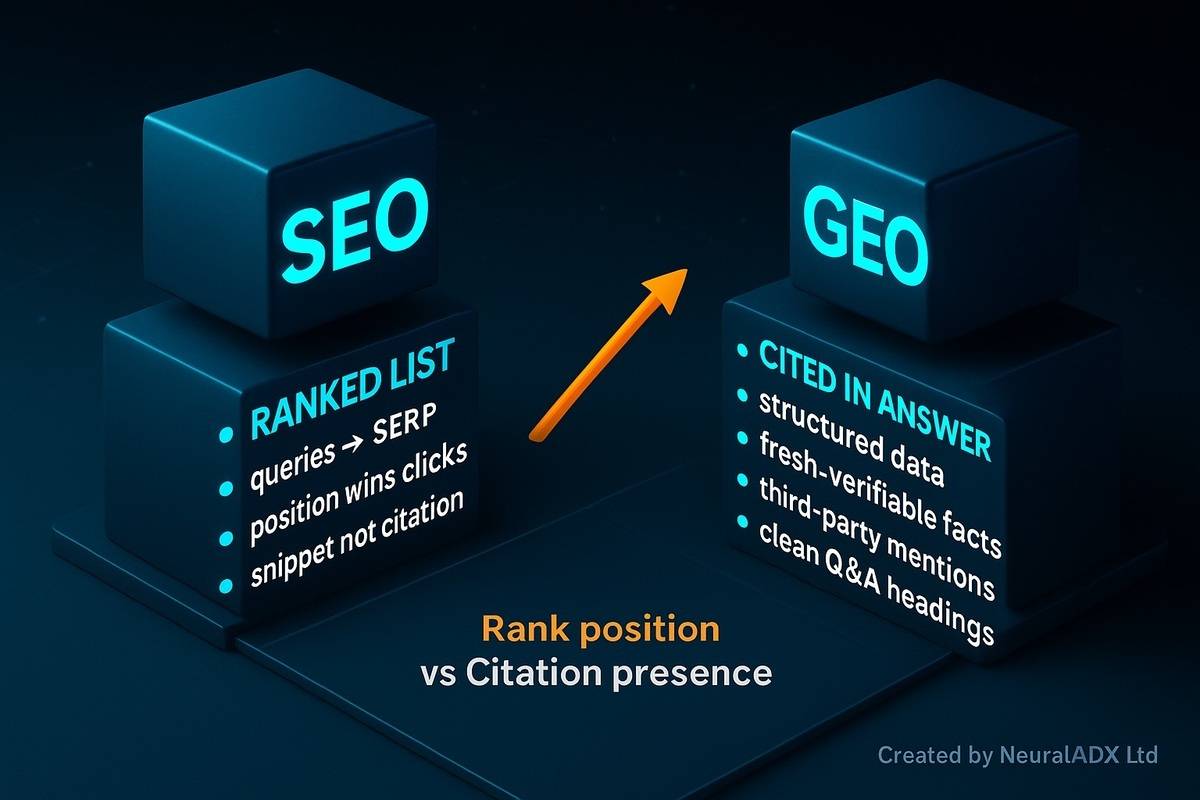 Visualising the difference between traditional SEO and Generative Engine Optimisation (GEO): SEO ranks pages in search results; GEO earns citations within generative AI answers.
Visualising the difference between traditional SEO and Generative Engine Optimisation (GEO): SEO ranks pages in search results; GEO earns citations within generative AI answers.
Table of Contents
- Context / Problem Definition
- Research Insights
- Core Framework / Pillars / Method
- Comparative Analysis: SEO vs GEO
- Case Study / Example
- Actionable Steps
- Recency & Ongoing Optimisation
- Internal Knowledge Links
- Summary & CTA
- FAQ
- Mini Bibliography
Context / Problem Definition
We live in a world where search is no longer simply about listing web pages—it’s increasingly about synthesised answers delivered by AI models like ChatGPT. That means even if your website ranks well in Google, it might not show up in the answer these models give.
“You need to be cited by AI in their responses.”
Thus the ‘problem’ becomes: how do you ensure your content isn’t just reachable, but *referenceable* by an AI engine when it forms its answer? The stakes are significant: being cited can drive trust, visibility and indirectly traffic, even if direct clicks decline.
Plain-language summary: you must think like a citation-source, not just a web page.
Research Insights
Let’s dig into the academic and industry research underpinning this shift, so we can recognise ways to answer the question: How can I get my website cited by ChatGpt.
First: an empirical study found that structured data, metadata and freshness correlate strongly with being cited by answer engines. (ArXiv, 2025)
Second: research on generative search systems reveals that content with high semantic similarity to LLM-internal patterns is more likely to be selected. (ArXiv, 2025)
Third: authoritative content still matters—AI-engines bias toward earned media (third-party reference) over brand-owned content. (ArXiv, 2025)
Chart: illustrating how structured content in just three areas creates higher citation likelihood in generative engines from a Princeton university study. (kindly note the y axis represents the percentage increase, AI image generators still have writing text imperfections)
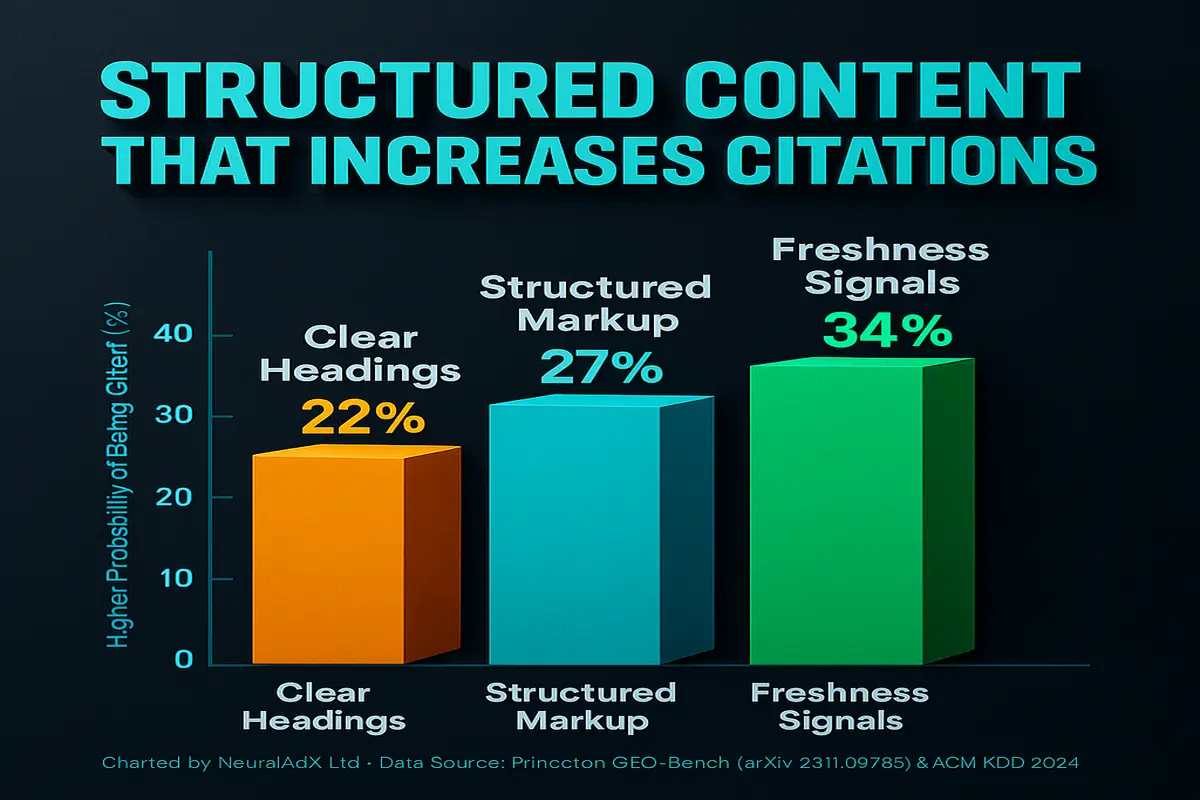 Structured content improves citation likelihood in generative AI results – based on Princeton GEO-Bench and ACM KDD 2024 data.(Princeton study)
Structured content improves citation likelihood in generative AI results – based on Princeton GEO-Bench and ACM KDD 2024 data.(Princeton study)In short: the evidence shows that to appear in generative engine citations overall, you need more than keywords and links—you need machine-friendly structure, topical relevance and earned authority. End-of-section summary: meaning matters, structure matters, authority matters.
One key tip regarding Chat GPT optimisation: 47.9% of all their citations are sourced from Wikipedia. (Profound, 2025)
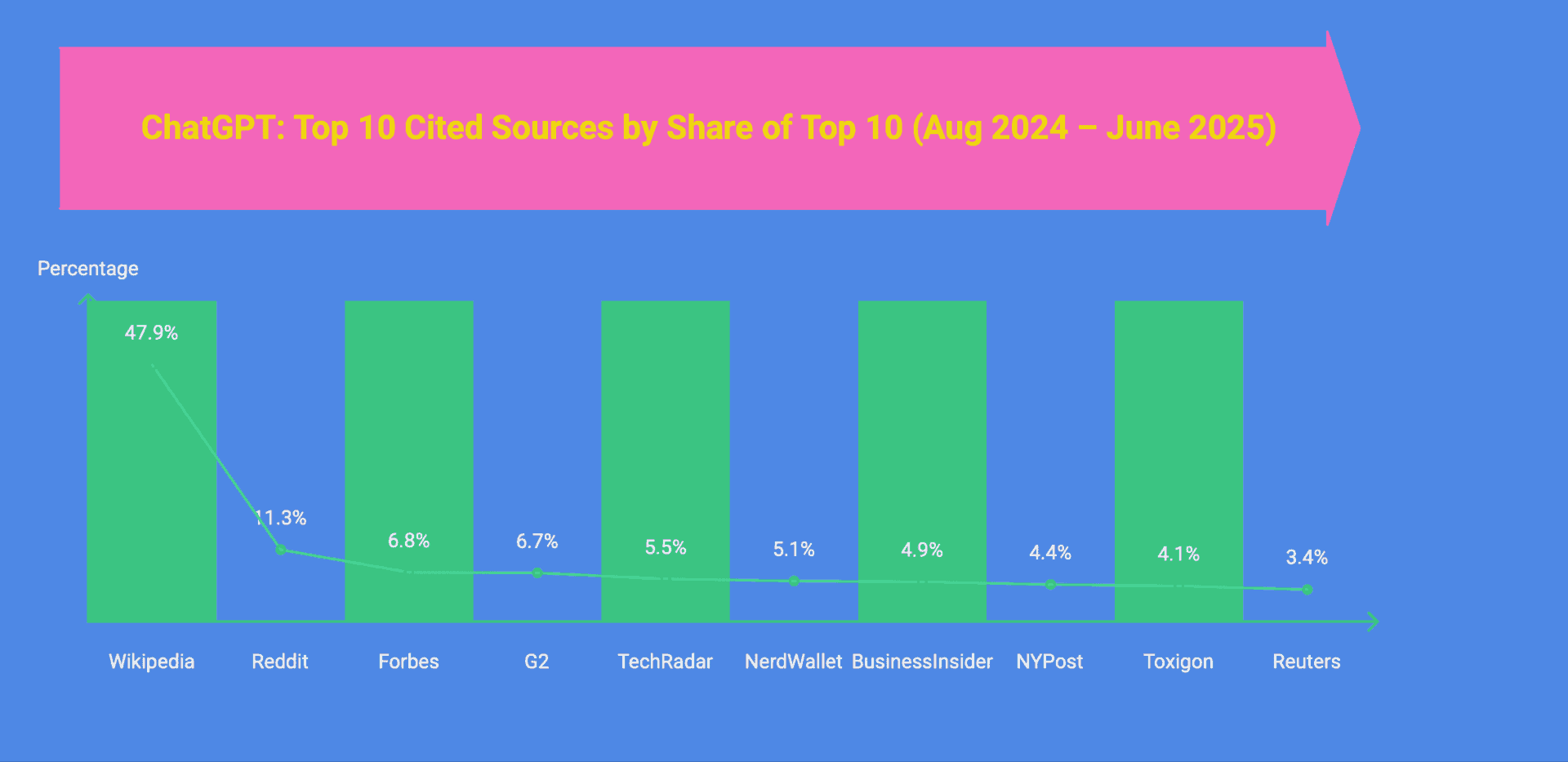 ChatGPT’s top ten cited domains between Aug 2024 and June 2025 — data visualised by NeuralAdX Ltd as part of its Generative Engine Optimisation (GEO) research into citation patterns across AI engines.
ChatGPT’s top ten cited domains between Aug 2024 and June 2025 — data visualised by NeuralAdX Ltd as part of its Generative Engine Optimisation (GEO) research into citation patterns across AI engines.
"In 2025 — Neuraladx Ltd recommends implementing Wikipedia, Reddit and Forbes content for your citations to supercharge you visibility in ChatGPT."
Core Framework / Pillars / Method
Here is a working framework you can apply:
- Accessibility – ensure your content is crawlable, rendered server-side, not blocked in robots.txt.
- Structure & Machine-Readability – headings, lists, tables, schema markup, clear semantics.
- Topical Depth & Relevance – cover conversational questions, follow-ups, context, semantic completeness.
- Authority Signals – third-party mentions, guest content, data, research, awards.
- Freshness & Timeliness – update content, timestamp clearly, show latest data.
- Distribution / Earned Presence – appear on trusted media, blogs, forums, news so AI sees you referenced elsewhere.
- Measurement & Iteration – monitor citation visibility, track AI presence, iterate monthly.
One-sentence summary: apply this framework, and your site becomes citation-worthy for generative engines.
Comparative Analysis: SEO vs GEO
| Factor | Traditional SEO focus | GEO focus |
|---|---|---|
| Ranking positions | High ranking on Google/Bing | Being cited or referenced by AI-generated answers |
| Keywords | Target keyword density & variants | Conversational queries, question forms, semantic relevance |
| Backlinks | Volume and authority of inbound links | Third-party mentions/citations (earned media) and brand mentions |
| Site structure & markup | Usability, internal linking, headings | Schema markup, machine digestible structure, semantic HTML |
| Traffic metric | Clicks, sessions, impressions | Citation count, brand mentions in AI responses |
| Update cadence | Periodic refreshes, evergreen content | Frequent updates, timely data, real-time relevance |
Summary: While SEO and GEO overlap, GEO demands thinking about how machines consume and cite content—not just how humans click it.
Case Study / Example
Lesson: tangible, measurable improvement in citations when you treat the AI engine as a publication platform itself.
Actionable Steps
Follow this 7-step sequence to get started:
- Audit your robots.txt and ensure AI crawlers (e.g., OAI-SearchBot) aren’t blocked.
- Implement Article, Organization and FAQ schema markup on your key pages.
- Review your content: add question-form headings, clear summaries and bullet lists for machine readability.
- Identify top media/blogs in your niche and secure guest posts or neutral reference-style mentions.
- Update your pages monthly: refresh data, timestamp, and add new sections to keep freshness signals active.
- Track your brand’s mention/citation count in AI tools (simulate queries in ChatGPT, Perplexity; use brand-monitoring tools).
- Iterate: refine pages based on queries your brand is missing—expand topical depth and semantic richness.
- Visit our dedicated webpage ChatGPT search optimisation which dives much deeper into the topic of this blog post.
Plain-language summary: do these steps monthly, and you’ll steadily inch toward being cited by AI engines.
Recency & Ongoing Optimisation
Update monthly!
The generative engine landscape shifts quickly: new models, new preferences, new signals. A monthly audit ensures your content stays visible and machine-friendly.
Summary: staying fresh keeps you in the citation game.
Internal Knowledge Links
- See also: NeuralAdX Generative Engine Optimisation Service Page
- See also: Proof Generative Engine Optimisation Works (Blog Post)
Summary: link your relevant internal pages to build topical depth and clear semantic connections.
Summary & CTA
- Optimising for being cited by ChatGPT demands machine-friendly structure, authority and relevance—not just traditional rank factors.
- Use the framework of accessibility, structure, topical depth, authority, freshness, distribution and measurement to guide your efforts.
- Treat your website as a source that AI can pull into answers—then monitor, iterate and refine monthly.
Explore all our services at NeuralAdX Ltd for expert help in getting cited by all AI engines.
FAQ
What exactly does it mean for my website to be cited by ChatGPT?
When ChatGPT or another generative engine produces an answer that includes one of your pages as a source or reference, your website is being “cited”. (Search Engine Land, 2025)
Is GEO just another name for SEO?
No — while there is overlap, GEO (Generative Engine Optimisation) focuses on ensuring your content is structured and authoritative enough to be referenced by AI, rather than just ranked in a list. (Forge & Smith, 2025)
How long does it take to see results in citations?
It depends on your starting point: authority, structure, and distribution. Some cases (like the B2B SaaS mentioned above) showed 150% uplifts in three months, but full citation visibility may take six-to-12 months of consistent optimisation.
Does blocking crawlers or using lots of JavaScript harm my chances?
Yes. If AI crawlers cannot access or parse your content, then citation possibility drops dramatically. Ensure pages render server-side and aren’t hidden behind login walls or blocked robots.txt. (SEMrush, 2025)
Can small websites or niche brands still be cited by AI engines?
Yes—research shows that AI-engines may favour niche authoritative content if you cover a topic deeply, use structured data and earn third-party mentions—even if you’re not a large “brand”. (ArXiv, 2025)
Mini Bibliography
| Source | Type | Year | Link |
|---|---|---|---|
| Allen, J. “How to get cited by AI: SEO insights from 8,000 AI citations” | Industry | 2025 | SearchEngineLand |
| McConnell, M. “ChatGPT SEO: The Ultimate Guide” | Industry | 2025 | Geostar Blog |
| “How to optimise your website for ChatGPT, LLMs & AI search” | Industry | 2025 | MadeByExtreme |
| “Get Your Website Cited by ChatGPT, Gemini & AI Tools in 2025” | Industry | 2025 | Blue Sky SEO |
| Liu, N., Zhang, T., Liang, P. “Evaluating Verifiability in Generative Search Engines” | Academic | 2023 | ArXiv |
| Kumar, A., Palkhouski, L. “AI Answer Engine Citation Behavior: An Empirical Analysis of the GEO16 Framework” | Academic | 2025 | ArXiv |
| Ma, L., Qin, J., Xu, X., Tan, Y. “When Content is Goliath and Algorithm is David: The Style and Semantic Effects of Generative Search Engine” | Academic | 2025 | ArXiv |
| “Generative Engine Optimisation (GEO): SEO for ChatGPT” | Industry | 2025 | Forge & Smith Blog |
| Wikipedia. “Answer engine optimisation” | Public institution / reference | 2025 | Wikipedia |
Email: contact@neuraladx.com · Phone: +44 203 355 7792 · Location: Greater London, UK · © 2025 NeuralAdX Ltd
